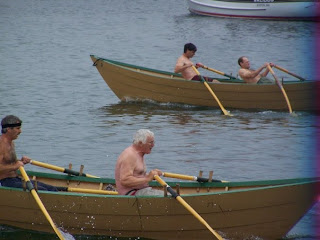 From generation to generation Gloucester, MA and Lunenburg, Nova Scotia have produced some of the finest fishermen the world has ever seen, which is why in 1951 it was only natural that these two maritime communities joined together in a friendly rivalry to challenge each other’s seafaring skills in what is now know as the International Dory Races.
From generation to generation Gloucester, MA and Lunenburg, Nova Scotia have produced some of the finest fishermen the world has ever seen, which is why in 1951 it was only natural that these two maritime communities joined together in a friendly rivalry to challenge each other’s seafaring skills in what is now know as the International Dory Races.
Each year in the Spring Canadian rowers are hosted in a competition in Gloucester and in the fall Gloucester rowers venture to Canada for a competition in Lunenburg. This year the Gloucester competition will occur on the weekend of June 19th.
The day’s events will kick off on Saturday, June 19th with a pancake breakfast at 8:00 am at the Gordon Thomas Park at the head of the harbor. The breakfast is open to the public for a modest charge with all proceeds going to the organization that keeps this time honored tradition afloat.
Jim Tarantino and the entire team at the International Dory Races committee always do an exceptional job at this event and Brent “Ringo” Tarr ensures that the breakfast is a tremendous success.
After the breakfast and at approximately 10:00am the races between Gloucester and Lunenburg will commence. Some of the featured races will include mixed doubles, juniors, over 40 and seniors. Once the races are finished and the winners are recorded, there will be an awards banquet at 1:00pm to congratulate all of this year’s fine competitors for what will surely be another exciting day of close races.
Please join us in honoring this great tradition of sportsmanship and friendly competition. The day will write another chapter in the long and lustrous tradition of the nation’s oldest seaport, and you can be a part of it. For more information please click here to go to the International Dory Races official website.














